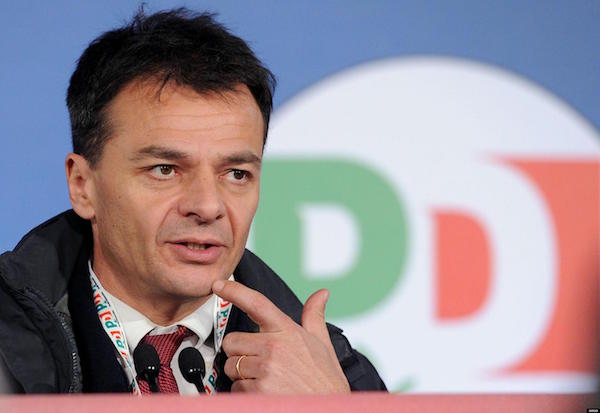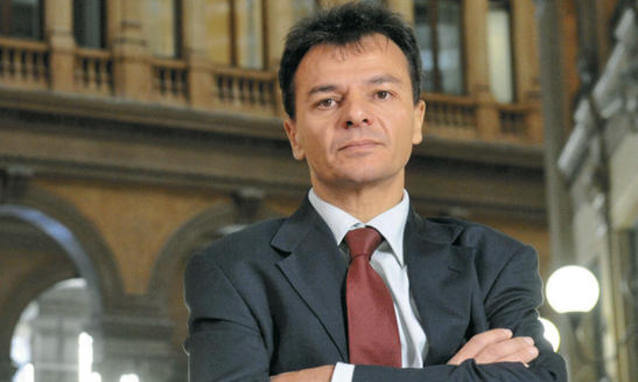By Stefano Fassina
The Ventotene summit among Prime Minister Renzi, Chancellor Merkel and President Hollande took place recently. Crucial issues were on the agenda: the geo-political conflicts at the borders of the European Union; internal security; migratory flows; economic growth. A strong wind of rhetoric about relaunching the ideals of the founding fathers of a united Europe animated the meeting. But it made zero progress in tackling, even in analysing, the basic reasons underlying the undergoing disintegration of the EU.
Like its “sleepwalking” elites in the lead-up to the First World War, Europe’s ruling classes go on without acknowledging reality even though they have been sent clear messages. Mirroring political developments on the other side of the Atlantic, the vote for Brexit illustrates the economic, social and democratic unsustainability of the neoliberal order for increasing numbers of working families and the middle class. US and UK: anti-establishment feeling is highest where the establishment, on both right (Reagan and Thatcher) and left (Clinton and Blair), has characterized itself most strongly by implementing neoliberal programs. In this context, Brexit in 2016 could represent for neoliberalism what the fall of the Berlin Wall represented for socialism in 1989.
Despite the evidence staring leaders and officials in the face, the discussion in the European Union and in the eurozone remains prisoner to Europeanist conformism, as if the culture, the treaties and the political agenda driving European integration and still running the show weren’t deeply rooted in neoliberalism. Neoliberalism has failed, but for the most extreme neoliberal manifestation, the euro-zone, it’s business as usual. We keep hearing rhetorical invocations of the United States of Europe or, at least, “more Europe”, and calls for a eurozone treasury minister. On the left, and even more so in a significant part of the so-called “radical left”, it’s even worse: what’s being proposed is a completely unrealistic democratization of the EU and whoever attempts to point out the unsustainability of the single currency and urges reflection on a Plan B for moving beyond the euro in order to save the EU is dismissed as a sovereign-tist, a neo-nationalist, a populist, and consequently associated with Grillo, Salvini, Le Pen and Farage.
The poverty of analysis underlying the political agenda is truly embarrassing, particularly in the socialist camp, despite the positions taken by more and more progressive and even mainstream economists. Last week, an authoritative intellectual, an icon of the radical left, one certainly above suspicion of anti-European sympathies, Joseph Stiglitz, provided an in-depth explanation for the unsustainability of the economic and social order of the eurozone. In The Euro: How a Common Currency Threatens the Future of Europe, the 2011 Nobel economics laureate explains how the euro produces divergent dynamics among the participating countries, generates stagnation and, in the best of cases, thanks to a desperate monetary policy, shores up precarious equilibriums of high unemployment. In sum, the contraction or prolonged slump of the eurozone economy is not the result of an inadequate response to an exogenous crisis or consequence of fiscally irresponsible national governments. It is the very physiology of the euro system because this is based on devaluation of labour. The fundamental problem of the eurozone is not austerity. The problem is that we have “constitutionalized” an extreme version of neoliberalism that not even the triumphant conservatives in the heyday of Reagan and Thatcher would have dared propose: the Statute of the ECB on one hand and the Fiscal Compact on the other, in the framework of the devaluation of labour begun in Germany by the so-called “Hartz reforms”, by far the most anti-European act perpetrated in the post-war era within the EU.
Solutions do exist on paper for re-directing the single currency onto a pro-labour route. A good summary of them is found in Stiglitz’s book: from imposing tight regulations on capital flows and the banking system to force them to service the real economy to restructuring public debt; from shelving the Fiscal Compact in order to finance a green New Deal to raising incomes in countries with trade surpluses. The problem, clear to Prof Stiglitz but unnoticed by our blinkered followers of Altiero Spinelli’s dream of a United States of Europe, is the absence of the minimum consensus required in national contexts to approve the necessary corrections. Unfortunately, a European demos doesn’t exist: the demos is national because of deep cultural, historical and social roots. In other words, democracy is either national or it is not.
In this context, for the peripheral countries of the Eurozone to clash with Berlin over a few tenths of a percentage point of bigger fiscal deficits is ridiculous. So are calls for further supply-side measures to spur further labour devaluation in the attempt to improve competitiveness and to bank on the domestic demand of neighbors. This policy, recommended to and implemented by all the euro countries, is useless for improving the relative position of an individual economy. But it’s very effective in depressing domestic demand in the eurozone, perpetuating stagnation and pushing working families and middle classes into the grasp of nationalistic, xenophobic forces preparing, linked to fear and insecurity generated by terrorist attacks and immigration flows, the perfect storm.
As difficult as it may be, the political and policy debate should face the uncomfortable truth before us and discuss the alternatives to adjustments of the euro. Progressive European leaders should find the intellectual and political bravery to admit that the euro was a political blunder of historic proportions and define a way out of the trap in order to revitalize democracy, promote full employment/decent jobs and reduce inequality. Prof Stiglitz articulates a couple of alternatives to the current stance of “muddling through”: an “amicable divorce” to arrive at a euro of northern Europe and a euro of southern Europe; the exit of Germany and its satellites from the eurozone.
Sleepwalking in line behind mercantilist Germany is suicidal not just for the eurozone but for the European Union as a whole.











